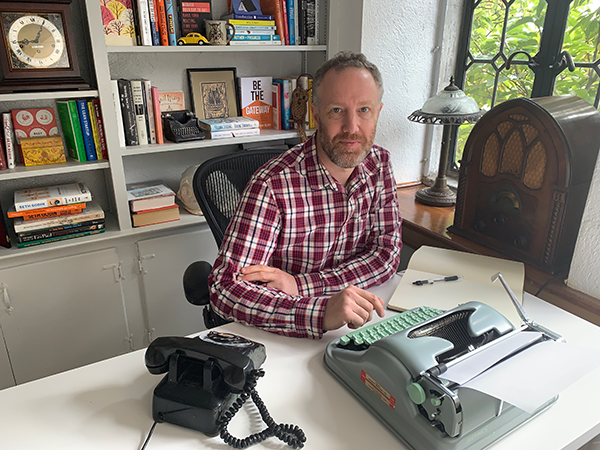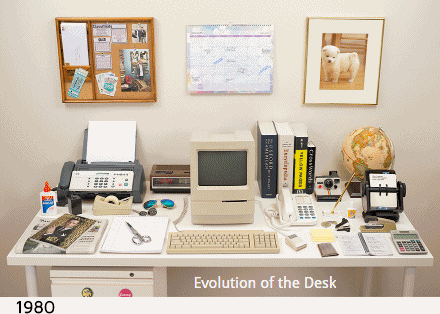A couple months back, I took this photo of myself here in the studio:

I collect vintage things, and it was fun to setup my desk without a computer at the center of it. Present in the photo are many of the communication tools that someone would use to before the internet.
It reminds me of this visualization of “The Evolution of the Desk” from the 1980s to today. This was created by the Harvard Innovation Lab:

Day in and day out, I help writers share their work with readers, and ensure that it truly connects to other human-beings. Of course, many of the tools that we can use to do this involve the internet and social media. While the screens of our phones and laptops represent one way to connect other people with your creative work, they are not the only way.
I hear from many writers who are apprehensive about social media. Who don’t want to start a newsletter. Or a blog. Or a podcast. In fact, they are concerned about being seen at all.
Today, I want to discuss methods for a writer to connect with readers that don’t rely on today’s “standard” methods of doing so: posting to social media, blogs, newsletters, podcasts, videos, and the like.
A few questions I will explore as we dig into this:
- What would you do to reach readers?
- How can you identify “influencers” who have access to your potential readers?
- What are meaningful ways to connect with your ideal audience?
- How would you keep in touch with those who support your creative work?
In other words: how can you use offline means to replace what social media does? And do so in a manner that feels authentic to who you are. I want to be clear: the goal isn’t to hire a publicist or marketing firm to “pitch” you to the media. A core part of what I am exploring here is how do you have a fulfilling and meaningful connection to other people as a writer? How do you grow a readership and stay connected to them? How do you have colleagues with other writers who love the kind of work you create?
Let’s look at some realistic options of what you may need to do so without social media and digital tools:
- A System to Organize Your Contacts
Buy a Rolodex! Okay, even I was surprised to learn that they still make these! There are many varieties on Amazon (and other retailers), and vintage versions are plentiful on eBay. If you want to stay connected with those who already support you and your work, and if you want to reach out to potential readers and those who reach them, you should organize this process. Nowadays we use contacts in our phones, the contact list in your email, friends on Facebook, subscribers for your email newsletter, and the like. Without those things, a physical Rolodex is one good option. - Set Up In-Person Meetings
Human beings are hard-wired to develop trust in a variety of ways, and an in-person conversation is an amazing way to do so. Why not fill your life with coffee with readers, with conversations with other writers, with visiting organizations who support the connection between writers and readers? This would be in place of digital means of doing so: Tweets that may not be as deep, but likely more frequent than an in-person meeting. Or texts you send to those you know, or virtual meetings on Skype, Facetime, or Zoom. - Organize Your Time and Attention
Get a big wall calendar, or a physical planner. There has been a renaissance in the planner market, so you have lots of options here. This is physical workbook where you can organize your time and attention, help set clear goals for each year/month/week/day in terms of how you will create and connect your work to others. This would be instead of using a digital calendar, or the many online tools such as spreadsheets or services such as Airtable which help you organize complex projects. - Pitch Articles or Speaking Events
One way for people to become aware of you and what you create is to be featured in media that other people own. You can pitch articles to magazines and newspapers, and reach out to conferences, organizations, and bookstores to do in-person speaking or workshops. I have worked with plenty of writers who do this. It is a different way to connect beyond posting your own blogs, running your own podcast, sharing videos on your own website, or sharing longer social media updates to Twitter (via series of Tweets), Facebook, or Instagram. - Build Rapport With Communities That Support Writers and Readers
Spend time building a network of people that you know at bookstores, writing programs, reading groups, and other places that support readers and writers. This will likely involve frequent travel, whether it is local, regional, national, or even beyond. This takes the place of following a bookstore on social media and engaging with them that way, or via email an online event of some sort. Likewise, it would mean sidestepping any online communication channels that these organizations have setup, such as a Facebook page or online events. - Stay Informed: Read Industry News With Intention
Many writers I speak to are overwhelmed by the sheer amount of information coming at them. An endless stream of blogs, articles, forums, podcasts, newsletters, social media updates, videos, webinars and the like which is all pitched as “must-know” information! Alternatives to this are the journals, magazines, newspapers, nonfiction books, and other media that do still exist which shares useful information. These resources may be (at times) more limited in frequency, timeliness, or even even depth than online tools. And they may provide less of direct access to others who are engaging in the content. But it is possible to stay informed without feeling like you are drinking from a firehose. - Buy Books Similar to What You Write, and Read!
This is a great way to get to know the market for your books! Read lots of books in the same genre/topic you write in to get a sense of the marketplace. Of course, if we are keeping this mostly offline, that means you may do this by going to physical bookstores or libraries, and relying on the recommendations of the person behind the counter. So you wouldn’t be reading Goodreads and Amazon reviews, or getting book recommendations from friends and colleagues on Twitter, Instagram, Facebook or YouTube. - Be Remarkably Generous
If you use the means above, don’t just barely show up in other people’s lives. Make an impression. If you want to build a network of people who are aware of your writing, it matters that people remember you. It’s easy to say “be generous!” or “be authentic,” but in our busy every day lives, what truly makes an impression on other people? Well, here is one example I saw this week. You see, I follow a lot of different channels on YouTube including an electrician in Scotland, a carpet cleaning repair service in Georgia, a mason in California, and this guy Steve in Virginia who repairs shoes. Well, Steve’s channel has more than 50,000 subscribers. Amazing, right? This week he received a package from a fan who painted two portraits of Steve, and sent a card and t-shirt. If you watch the video, you can see how moved he is by this. Then there are 300 comments below the video of celebrating with him, saying “You deserve it Steve, it just shows how many people you’ve impacted in a positive way.” My point is: to make an impression, you have to show up to truly connect with someone in a meaningful manner. You will find other examples of this in my podcast interviews, where authors like Jessica Lahey send out hundreds of books as gifts, one-by-one, to individual people who they feel may like it.
As I consider each of these tactics, they feel very grounded in real human connections. But there is a downside as well. They feel resources intensive. Doing them well will take a lot of your time, energy, and money.
It’s hard to not conclude that the tools which sometimes overwhelm us (social media, newsletters, email, etc) begin to feel very powerful and accessible in comparison with offline options. In truth, I think a mix of online and offline tools can be very powerful for any writer. And of course, each writer gets to decide this path for themselves.
One thing I think a lot about in this process are the resources that a writer needs regardless of how they connect with their audience and develop their platform.
They need total clarity on their goals as a writer. They need habits to create and connect amidst an otherwise busy life. They need accountability and support to make this all sustainable. These are things that I work with writers on in my Creative Shift Mastermind every single day.
Thanks!
-Dan
